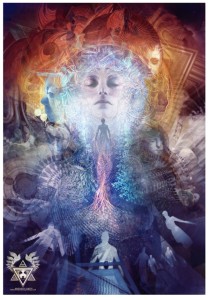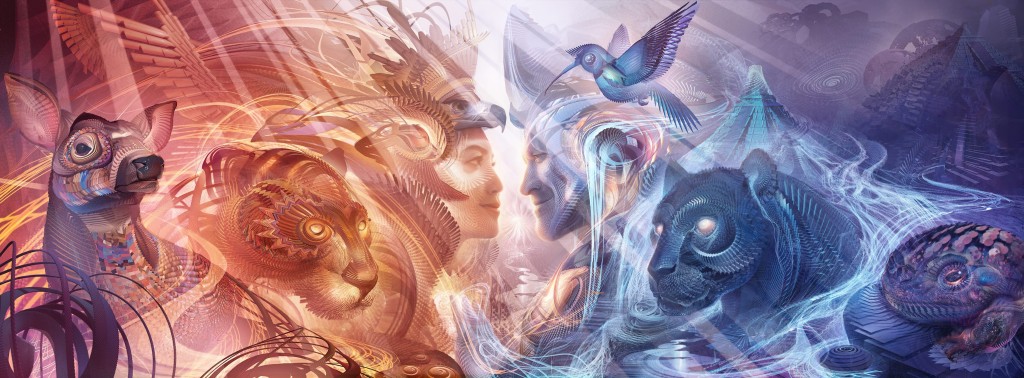 “Your species as a species includes the idiot and the genius, the stupid and the wise, the athletic, the deformed, the beautiful and the ugly, and all variations in between. There are genetic cultures operating, then, of literally infinite variety, and they each have their place and their reason, and they each fit into the overall picture—not only of man’s reality but of the planet’s reality, including all of nature.
“Your species as a species includes the idiot and the genius, the stupid and the wise, the athletic, the deformed, the beautiful and the ugly, and all variations in between. There are genetic cultures operating, then, of literally infinite variety, and they each have their place and their reason, and they each fit into the overall picture—not only of man’s reality but of the planet’s reality, including all of nature.
Your religious ideas have often told you that deformities at birth were the result of the parents’ sins cast upon the children, or that another kind of punishment was involved in terms of “karma.” In terms of biology, people talk about coming from good stock or bad stock, and even those designations imply moral judgments.
The entire idea of reincarnation has been highly distorted by other religious concepts. It is not a psychological arena composed of crime and punishment. Again, you have free will in the conditions of your life, given the characteristics that are your own. The great facility and adaptability of the human species are dependent upon an amazing interplay between genetic preciseness and genetic freedom. The very characteristic attributes of the species, its dependability and integrity, are dependent upon constant checks and balances, the existence of divergent characteristics against which the species can measure itself…
…You choose your genetic structure so that it suits the challenges and capabilities of the species. You choose your genetic structure so that it suits the challenges and potentials that you have chosen. It represents your physical reference point, your bodily framework. It is your personal physical property. It is a portion of physical matter that you have identified, filled out with your own identity. It is like a splendid ship, the body, that you have chosen ahead of time for a splendid challenging adventure—a ship that you have personally appointed that is equipped to serve as much as possible as a physical manifestation of your personhood.
Some people, in beginning such a venture, will indeed insist upon an excellent vessel, with the most sophisticated mechanisms, equipped with grand couches and a banquet room. Others would want much more excitement, much more zest, and order then instead a less grand vessel, but one that went faster. Some would set goals for themselves that demanded that their powers of seamanship be tested. The analogy may be a simple our, yet each person chooses the living vessel of the body, with his or her own intents and purposes in mind.
In physical reality, if you will forgive me, life is the name of the game—and the game is based upon value fulfillment. That means simply that each form of life seeks toward the fulfillment and unfolding of all of the capacities that it senses within its living framework, knowing that in that individual fulfillment each other species of life is also benefited.
In no way do I mean to demean the indisputable value of geniuses, or their great contributions to the quality of life— but the quality of life is, again, also benefited by the existence of idiots. Not only because both ends of the scale are necessary for genetic reasons, but also because idiots themselves are in no way considered failures or defects by nature. Those terms are human judgments. Idiots also serve their role by moderating the sometimes fierce hold that the reasoning mind can have upon human activity.
The idiot is often able to experience in his or her own reality a freer, more generous, more faithful flow of emotional states, unhampered by reason’s sometimes stern dictates, and it is important that such a moderating tendency does operate genetically…
…The reasoning mind, as you have used it thus far, roughly since the birth of Christianity, has confined its reasoning abilities to a very narrow spectrum of reality. It has seen the value of life largely only as that life conforms to its own standards. That is, the reasoning mind, as you have used it, considers that only reasoning creatures are capable of understanding life’s values. Other forms of life have almost seemed beside the point, their value considered only insofar as they were of service to man. But man’s life is obviously dependent upon the existence of life’s other species, and with him those species share certain values. Life is sacred– all life– and again, all life seeks value fulfillment, not simply physical survival…
 …The most important aspects of individuality, are those subjective characteristics that on the one hand distinguish each person from the other, and that on the other hand are each like sparkling psychological mosaics, giving separate, exquisite Individual versions of that larger pattern from which mankind emerges. The security, the integrity, and the brilliance of individuality rises in these terms from that universal genetic language, and also from the inner subjective universal language of dreams. There are great connections between the two, and both are spoken together.
…The most important aspects of individuality, are those subjective characteristics that on the one hand distinguish each person from the other, and that on the other hand are each like sparkling psychological mosaics, giving separate, exquisite Individual versions of that larger pattern from which mankind emerges. The security, the integrity, and the brilliance of individuality rises in these terms from that universal genetic language, and also from the inner subjective universal language of dreams. There are great connections between the two, and both are spoken together.
Let us become more practical, and see how the these issues merge in your reality. Some of this requires a great honesty on your own parts, as you try to recall some feelings and daydreams are you have tried to put away or forget or disown. Why are some people, then, born with conditions that are certainly experienced as genetically defective, granting even the overall value of such variances on the part of the species? For, again, I must stress the fact that in its way nature makes no such judgments regardless of the beliefs of your science or religions.
Science seems to be of the opinion that the individual is important only insofar as he or she serves the purposes of the species’ survival—and I am not saying that. I am saying that the existence of each individual is important to the value fulfillment of the species. And moreover, I am stating that the value fulfillment of the individual and the species go hand in hand.
I am also stating that the species is itself aware of those conditions that lead to its own value fulfillment, and that of its members. No species basically biologically considers its own existence with other species except in a cooperative manner—that is, there is no basic competition between species. When you think that there is, you are reading nature wrong. Whatever man’s conscious beliefs, on a biological level his genetic structure is intimately related to the genetic structure of all other species…
*…If joy has always been one of the characteristics of earth experience, so has suffering, and the subject will be covered in this book. Here, however, I only want to mention one facet, and that is the importance of physical sensation of whatever kind—for the life of the body provides you, among all things, with a life of sensation, of feeling, a spectrum that must include the experience of all possible sensations within its overall range.
Now as you will see, all creatures, regardless of their degree, can and do choose, within their spheres of reality, those sensations that they will experience—but to one extent or another all, sensations are felt. We will later discuss the part of the mind and its interpretation, for example, of painful stimuli, but I want to make the point that those attracted to physical life are first and foremost tasters of sensation. Outside of that, basically, there are all kinds of mental distinctions made [among] stimuli. The body is made to react. It is made to feel life and vitality by reacting to an environment that is not itself, by encountering what you might call natural stress. The body maintains its equilibrium by reacting against gravity, by coming in contact with other bodies, by changing its own sensations, by glorifying in the balance between balance and off-balance….*
…By themselves, whether they appear as superior or defective conditions, they necessitate a different kind of adaptability, a change of subjective or physical focus, the intensification of other abilities that perhaps have been understressed. Yet granting all this, why, again, would some individuals choose situations that would be experienced as defective conditions? For this, we need to examine some human feelings that are often forgotten.
Now I have often said that suffering of itself is not “good for the soul ” it is not a virtue, yet certainly many individuals seem to seek suffering. Suffering cannot be dismissed from human experience as a freak matter of distorted emotions or beliefs.
 Suffering is a human condition that is sought various reasons. There are gradations of suffering, of course and each person will have his or her definitions of what suffering is. Many people do indeed equate a certain kind of suffering with excitement. Sportsmen, race-car drivers, mountain climbers—all seek suffering to one extent or another, and find the very intensity of certain kinds of pain pleasurable. You might say that they like to live dangerously .
Suffering is a human condition that is sought various reasons. There are gradations of suffering, of course and each person will have his or her definitions of what suffering is. Many people do indeed equate a certain kind of suffering with excitement. Sportsmen, race-car drivers, mountain climbers—all seek suffering to one extent or another, and find the very intensity of certain kinds of pain pleasurable. You might say that they like to live dangerously .
Some sects have believed that spiritual understanding came as the result of bodily agony, and their self inflicted pain became their versions of pleasure. It is usually said that animals, and also man, avoid pain and seek pleasure—and so any courting of pain, except under certain conditions, is seen as unnatural behavior.
It is not unnatural. It is an eccentric behavior pattern. Many children daydream not only of being kings or queens or given great honors, they also daydream about being tragic figures. They daydream of cruel deaths. They glory in stories of wicked stepmothers. They imagine, in fact, every situation that they can involving human experience. To an extent adults do the same thing. They are drawn to cinema or television dramas that involve tragedies, sorrows, great dramatic struggles. This is because you are alive as the result of your great curiosity for human experience. You are alive because you want to participate in human drama.
While I admit that many people will not agree with me, I know from experience that most individuals do not choose one “happy” life after another, always ensconced in a capable body, endowed by nature or heritage with all of the gilts most people seem to think they desire.
Each person seeks value fulfillment, and that means that they choose various lives in such a fashion that all of their abilities and capacities can be best developed, and in such a way that their world is also enriched. Some people will choose “defective” bodies purposely in order to focus more intensely in other areas. They want a different kind of focus. They want to sift their characteristics through a certain cast. Such a choice demands an intensification. It is made on the part of the individual and on the parts of the parents as well, so that a certain group of people will relate to the world in a highly characteristic way. In almost all such cases, such people will be embarked upon subjective issues and questions also that might not be considered otherwise. They will ask questions on their own parts that need to be raised, not only for themselves but for the society at large.
Those questions help bring out psychological maturities and insights about the nature of the species in general. Many such conditions also serve to keep man s sympathies alive. I make a distinction between sympathy and pity, for a lively sympathy leads toward construction, toward the utilization of abilities, even to social discourse, while pity can be deadening. Your overreliance upon physical norms, and your distorted concepts concerning survival of the fittest, help exaggerate the existence of any genetic defects, of course. Many religious dogmas consider such conditions, again, the result of a god’s punishment. The survival of the species is far more dependent upon your subjective activities than your physical ones– for it is your subjective behavior that is responsible for your physical acts.
Science of course looks at it the other way around, as if your physical acts are the result of a robot’s mechanical, formalized behavior—a robot miraculously programmed by the blind elements of an accidental universe formed by chance. The robot is programmed only to survive at anyone’s or anything’s expense. It has no real consciousness of its own. Its thoughts are merely mental mirages, so if one of its parts is defective then obviously it is in deep trouble. But man is no robot, and each so-called genetic defect has an internal part to play in the entire picture of genetic reality. The principle of uncertainty must operate genetically, or you would have been locked into overspecializations as a species.
There are states of consciousness, one within the other, and yet each connected, of course, so that genetic systems are really systems of consciousness. They are intertwined with reincarnational systems of consciousness. These are further entwined with the consciousness that you recognize. The present is the point of power. Given the genetic makeup that you now have, your conscious intents and purposes act as the triggers that activate whatever genetic or reincarnational aspects that you need.
The state of dreaming provides the connecting links between these systems of consciousness…
…Some people, having lived lives believing in one religious system or another, being completely immersed in them, give themselves shock treatments of sorts, then, living lives in which they believe in nothing, or at least freeing themselves from any beliefs—only to discover of course, that a belief in nothing is the most confining belief of all. That realization is the eye-opener, in such cases.
There are those who overrelied upon religious beliefs, using them as crutches, and in [later lives] then, they might –such people—throw those crutches away overreacting to their new found “freedom”; and through living lives as meaningless they then realize, after death, that the meaningfulness of existence was after all not dependent upon any religious system. It was there all along, but they had not seen it.
The variations are endless. On the whole, in in the vast scheme of reincarnational reality, a belief in life’s meaning is by far the rule, and other excursions are indeed eccentric variations. Specifically, however, such life episodes will of course involve their “moments” of after-death realization—dismay, shock, or what have you.”
Above excerpts from: Dreams, “Evolution.” and Value Fulfillment Volumes 1&2 (bold emphasis mine)
——Seth recounts past lives of his———-
“I have been many times both man and woman, and I have immersed myself in various occupations, but always with the idea of learning so that I could teach. I had a firm background in physical existence, therefore, as a prerequisite for my present ‘work.’
“I did not play the part of any towering personality of historical note, but became experienced in the homey and intimate details of daily life, the normal struggle for achievement, the need for love.
“I learned the unutterable yearning of father for son, son for father, husband for wife, wife for husband, and fell headlong into the intimate webs of human relationships…
“Now I have always been a Speaker, regardless of my physical occupation. I have been a spice merchant in Denmark, where I knew Ruburt and Joseph.
“In several lives I was black—once in what is now called Ethiopia, and once in Turkey.
“My lives as monks followed my experience as a pope, and in one of these, I was a victim of the Spanish Inquisition.
“My experience in female lives varied from that of a plain Dutch spinster to a courtesan at the time of the Biblical David, to several existences as a humble mother with children…
“Those personalities are not locked up inside of what I am, however. They have progressed according to their own fashion. They are not negated. In my terms, they coexist with me, but at another layer of reality.” ~Seth Speaks, Session 588
——————
“I was once a mother with twelve children. Ignorant in terms of education, far from beautiful, particularly in later years, with a wild temper and raucous voice. This was around Jerusalem in the sixth century. The children had many fathers. I did my best to provide for them.
My name was Marshaba. We lived wherever we could, squatting in doorways and, finally, all begging. Yet in existence, physical life had a contrast, a sharpness greater than any I had known. A crust of bread was far more delicious to me than any piece of cake, however well-frosted, had ever been in lives before.
When my children laughed I was overwhelmed with delight, and despite our privations, each morning was a triumphant surprise that we had not died in our sleep, that we had not succumbed to starvation. I chose that life deliberately, as each of you choose each of yours, and I did so because my previous lives had been too blasé. I was too cushioned. I no longer focused with clarity upon the truly spectacular physical delights and experiences that earth can provide.
Though I yelled at my children and screamed sometimes in rage against the elements, I was struck through with the magnificence of existence, and learned more about true spirituality than I ever did as a monk. This does not mean that poverty leads to truth, or that suffering is good for the soul. Many who shared those conditions with me learned little. It does mean that each of you choose life conditions what you have for your own purpose, knowing ahead of time where your weaknesses and strengths lie.
In the gestalt of my personality, as in your terms I lived later richer lives, that woman was alive again in me—as, for example, the child is alive in the adult, and filled with gratitude comparing later circumstances to the earlier existences. “ ~Seth Speaks, the eternal validity of the Soul

